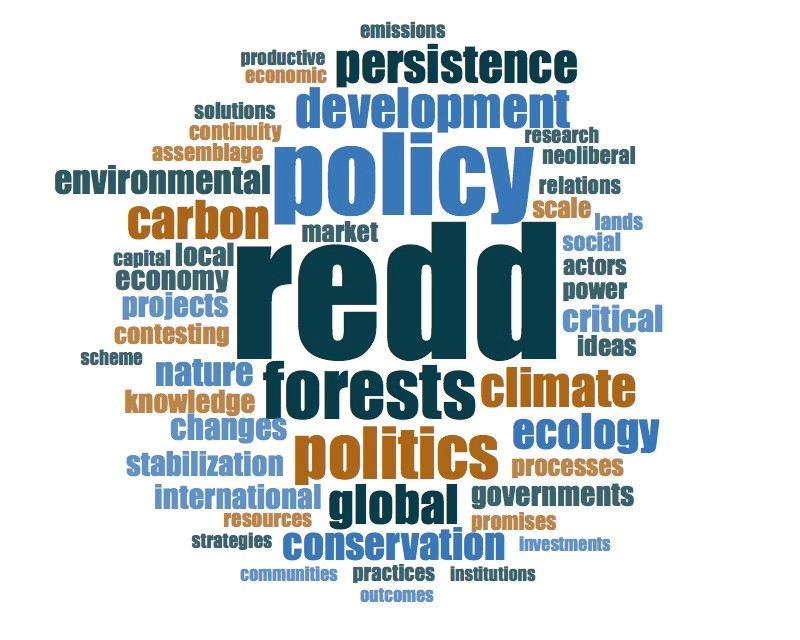This thread presents a special issue introduction and five contributions on the paradoxical persistence of REDD+ @PolEcoNet @UndiEnvi @forestideas @UNDP_REDDPlus @FAOForestry @RECOFTC @NCS_catalyst @Nature4Climate @IUCNclimatePASG @ClimateFdn @KU_IFRO (1/19)
Asiyanbi and Lund develop a political ecology of policy persistence by drawing on perspectives from critical policy studies, political economy and assemblage studies. https://journals.uair.arizona.edu/index.php/JPE/article/view/23493">https://journals.uair.arizona.edu/index.php... (2/19)
Asiyanbi and Lund demonstrate how REDD+ is an amalgam of policy, idea and ambition and how this challenges those seeking to contest it, while allowing a wide range of actors to rally around its multiple-win promises. (3/19)
Asiyanbi and Lund argue that REDD+ must be examined both as a specific set of practices in different places and as a policy proposal with overarching discursive and programmatic trajectories and impacts. (4/19)
Asiyanbi and Lund argue that the reductionist lens with which some researchers examine REDD+ (does it have an impact relative to a control site?) obscures the above point. (5/19)
Asiyanbi and Lund reiterate that additionality and leakage conspire to fundamentally undermine the credibility of REDD+ as offsetting. @FAOForestry @ForestPeoplesP @IUCN_forests (6/19)
Asiyanbi and Lund document an uneven geography of REDD+ knowledge production that we argue reflects and reproduces, rather than upsets, the north-south asymmetries at the heart of international development. @RECOFTC @gfc123 @forestideas (7/19)
Asiyanbi and Lund note how negative social outcomes of REDD+ were predictable and predicted. Yet temporal delay in outcomes allowed REDD+ to gain foothold, as did massive investments in development of, ultimately ineffective, social safeguards. @forestideas @UNDP_REDDPlus (8/19)
Asiyanbi and Lund show how REDD+ is selectively mobilized to support wider notions of forest-based climate mitigation and caution against the tendency to forget REDD+ lessons in efforts to promote Natural Climate Solutions. @ClimateCleanup @NathalieSeddon @Nature4Climate (9/19)
Torsten Krause examines the contradictions and tensions in Colombia’s current simultaneous embrace of REDD+ and a peace-building process premised on neoliberal approaches to development and continued extractivism. https://journals.uair.arizona.edu/index.php/JPE/article/view/23186">https://journals.uair.arizona.edu/index.php... @LUCSUS_LU (10/19)
Krause shows how REDD+ in Colombia’s post-conflict transition fails to displace deforestation but proceeds alongside deepening forest-intensive developments and complex local and regional dynamics, which are shaping post-conflict land use trajectories. @LUCSUS_LU (11/19)
Abidah Setyowati brings critical insights into the tensions in attempts to enroll communities into REDD+ in Indonesia through educational tools, forest surveillance, community policing, and participatory mapping. https://journals.uair.arizona.edu/index.php/JPE/article/view/23185">https://journals.uair.arizona.edu/index.php... @abidahbillah (12/19)
Setyowati draws on rich ethnographic and historical resources to show how local actors variously resist, adopt and creatively accommodate REDD+ in Indonesia’s Ulu Masen REDD+ scheme. @abidahbillah (13/19)
Franziska Müller unpacks NICFI’s REDD+ educational materials to unveil the politics of REDD+ capacity-building and subaltern education. https://journals.uair.arizona.edu/index.php/JPE/article/view/23198">https://journals.uair.arizona.edu/index.php... @squirrelista @Climateforest (14/19)
Müller reflects on the ways that significant donor investment in REDD+ education among indigenous peoples and local communities contributes to stabilizing the otherwise fragile global REDD+ assemblage. @squirrelista @Climateforest (15/19)
Sabaheta Ramcilovic-Suominen and Iben Nathan reveal how pervasive techno-managerial ideas across Laos REDD+ policy circles imply that REDD+ is just another top-down development project that serves the interest of Laos& #39;s elites. https://journals.uair.arizona.edu/index.php/JPE/article/view/23188">https://journals.uair.arizona.edu/index.php... @IbenNathan (16/19)
Through an incisive account of policy translation in Laos, Ramcilovic-Suominen and Nathan show how dominant REDD+ discourses hold little prospect for local people and forests, observing a lack of coalitions promoting non-carbon benefits, social safeguards, and equity. (17/19)
Adeniyi Asiyanbi and Kate Massarella unpack the politics of models, showing how REDD+ typifies an increasingly pervasive yet problematic process of pursuing conservation and development interventions through exemplary miniatures. https://journals.uair.arizona.edu/index.php/JPE/article/view/23540">https://journals.uair.arizona.edu/index.php... @KateDeMass (18/19)
Asiyanbi and Massarella argue that the pursuit of REDD+ mainly through model entities enable proponents to claim ‘success’, thereby allowing the scheme to persist in policy circles in spite of its failings on the ground and its lack of viability at scale. @KateDeMass (19/19)

 Read on Twitter
Read on Twitter


